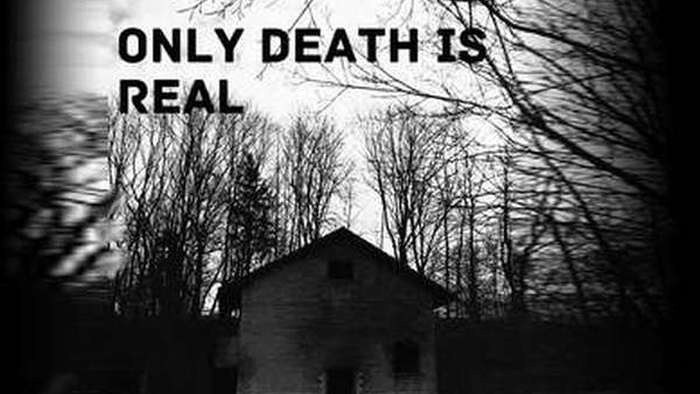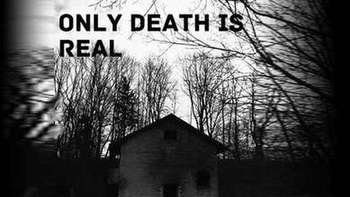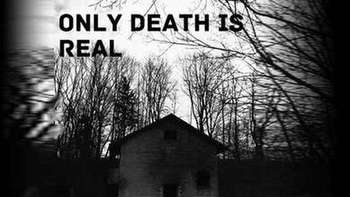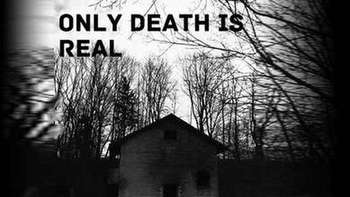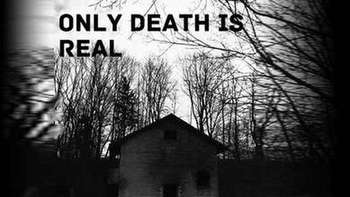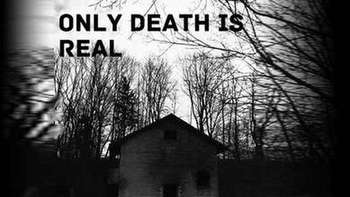Can you believe that it’s 2023? It hardly seems like last week that we were ushering in 2022 and trying to maintain an outlook of hope that maybe, just maybe, this was a year in which things got better. Judging by the music that makes up this edition of Only Death Is Real, hope is still hard to come by.
Cryptae – Capsule (Sentient Ruin Laboratories)
 Following up 2020’s Nightmare Traversal with the similarly strange Capsule are Dutch death metal weirdos Cryptae. How they find the time around their other projects is a mystery (do you sleep, Cryptae? Or is that the secret?), yet here we are with another slice of completely oppressive and disjointed death metal. Experimental is perhaps the most obvious take you could have but Capsule sits firmly on the side of “try anything once.”
Following up 2020’s Nightmare Traversal with the similarly strange Capsule are Dutch death metal weirdos Cryptae. How they find the time around their other projects is a mystery (do you sleep, Cryptae? Or is that the secret?), yet here we are with another slice of completely oppressive and disjointed death metal. Experimental is perhaps the most obvious take you could have but Capsule sits firmly on the side of “try anything once.”
Songs are wickedly short, giving a quick glance into the madness but never quite letting you see you inside, as though you are trying to peek through a window that is dirty on the other side and the frustration that comes with having to move your gaze constantly in order to make sense of what is before you. The cavernous “Deluge” flickers with guttural vocals and time signatures that are whipped into unrecognisable beats by the drums that know not how to stand still or evidently stay on the same track as the rest of the music. That’s not a negative, by the way, it’s so overwhelming that it somehow becomes fascinating. Where will this song go next? Whatever happens is always a complete surprise and it’s wonderful.
“Silt” is so deep and dirty that you feel unclean just by listening to it, and album closer “Ebb” flips to rampant guitars so frantic that you’re going to need a long sit down afterwards. Listen, I’ve got no idea what is happening for most of Capsule and I love it.
Esoctrilihum – Funeral (Self-Released)
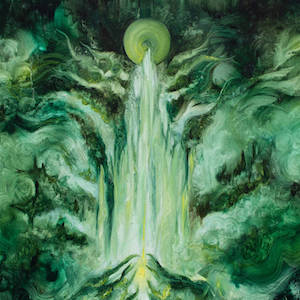 I don’t know what they’re putting in the water in France, but it seems to be working out for Esoctrilihum and its sole member, Asthâghul. Hardly a stranger to Only Death Is Real due to the sheer volume of their output, Esoctrilihum rang in the new year with yet another full-length release. Somewhat more straightforward in its approach compared to previous works, Funeral spends its time on pummeling the listener with atmosphere, with long-form compositions weaving a narrative around different vocal styles and goth-tinged synths, rather than novel-esque chapters and lore. On Funeral there is a deeper sense of the morbid and forlorn than we are used to and it is to Esoctrilihum’s benefit that these shadowy corners are explored to their fullest extent.
I don’t know what they’re putting in the water in France, but it seems to be working out for Esoctrilihum and its sole member, Asthâghul. Hardly a stranger to Only Death Is Real due to the sheer volume of their output, Esoctrilihum rang in the new year with yet another full-length release. Somewhat more straightforward in its approach compared to previous works, Funeral spends its time on pummeling the listener with atmosphere, with long-form compositions weaving a narrative around different vocal styles and goth-tinged synths, rather than novel-esque chapters and lore. On Funeral there is a deeper sense of the morbid and forlorn than we are used to and it is to Esoctrilihum’s benefit that these shadowy corners are explored to their fullest extent.
Funeral is an homage to decades past, a time in which music could be dark and curious, experimenting with new techniques and pushing the boundaries of what was considered “popular.” In much the same way, Asthâghul plays with the limits of black metal and diverges from the traditional aspects in several ways. Slow and meandering melodies are present on opening track “Funeral” and they play against deeper registered vocals, rendered in guttural screams and howls that purge the soul of all light. The inverse is true for following track “Annobathysm” as it ramps up the pace and incorporates clean-style vocals. This switch is fascinating as we’ve heard the technique being used before (Dy'th Requiem for the Serpent Telepath, for example), although not to the level it is present here. As the song progresses we hear sweet strings (a nyckelharpa, I think) that create a sickeningly cloying atmosphere in its brightness. The light it produces is slowly overwhelmed by the undertones of the guitars and the wretched vocals of Asthâghul until the strings themselves begin to take on new forms and enter the darkness along with the rest of the song.
“Pact” pulls all these differing elements together in a way in which Esoctrilihum hit the peak of their powers in one fell swoop. The song is a glorious and gothic twist on black metal that melds each opposing sound into one cohesive and beautiful melody while the splendour of final track “Païthas” showcases just how far Esoctrilihum has come in their last few releases.
Mesarthim – Anthropic Bias (Self-Released)
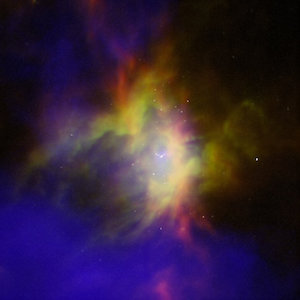 Mesarthim have been strangely quiet since the middle of 2021 and so the sudden appearance of this new (long) single in December was a moment of joy in an otherwise bleak winter. Or summer, considering the unknown members have at least let us know that they are based in Australia. Further information is not yet out there, yet each EP/album/single contains some morse code if you're inclined to figure it out.
Mesarthim have been strangely quiet since the middle of 2021 and so the sudden appearance of this new (long) single in December was a moment of joy in an otherwise bleak winter. Or summer, considering the unknown members have at least let us know that they are based in Australia. Further information is not yet out there, yet each EP/album/single contains some morse code if you're inclined to figure it out.
“Anthropic Bias” is another slice of bizarrely upbeat metal that has pushed its black metal roots aside to incorporate wildly poppy hooks and prescient synths. Vocals are still on the edge of the base genre -- in that they are harsh, shrieking and cold -- which only adds to the curious off-kilter vibe this duo present. The bones of it all give a sense of happiness yet there is a sly undercurrent of the void reaching back out to you in the waves of blackened guitar and the twisted voices that echo throughout. Drums are alienesque (potentially programmed) to give a feeling of otherworldly exploration, as though you are standing on the edge of the abyss and waiting for the final push. Give yourself over to Mesarthim as they reach for the stars.
Eliante / Trhä - Split (Self-Released)
 Oh look, another Trhä release to appear on this column. Are you shocked? No, me either. Not just because this is a great project but also because Trhä always seem to have something new. The last few releases have been a splits -- first with Acheulean Forests, this with French entity Eliante and another with Starcave Nebula. This is the one that spoke to me more out of the three, hence it’s inclusion here.
Oh look, another Trhä release to appear on this column. Are you shocked? No, me either. Not just because this is a great project but also because Trhä always seem to have something new. The last few releases have been a splits -- first with Acheulean Forests, this with French entity Eliante and another with Starcave Nebula. This is the one that spoke to me more out of the three, hence it’s inclusion here.
Starting with two tracks from Eliante, which certainly fit the Trhä vibe, the French single-member band adds an air of haunted mystery to their side of the split. “lvhêdtlfctvtcjhrên” is as chaotic as its title suggest with spinning guitars anchoring the fearsome vocals from Lueur adding to the ice-cold atmosphere. The language the two songs (the second being “nêêndbrê uctêhlêjvlznêrn rläêntê”) are written in is something that is likely to be of the artist’s own creation -- it does look similar to that of Trhä but I am not smart enough to figure it out. Curiously, Eliante has released songs in French and German so perhaps this is a melding/reimagining of the two.
Trhä’s side leans on the rawer, harder edge of the band’s sound with the ethereal elements naught but a memory in the raging guitars and frenzied vocals of “ahmar lan, tähh kesht khadgulab mecyra.” Thét Älëf (the sole member of the project) knows their way around a melody and the downtuned section that appears in the closing minutes is a wondrous and chugging juggernaut of sound that is both catchy and almost out of place. It works, in part because of its unusual appearance and that is the beauty of Trhä.
Transporting us to the eerie planes once more is the second track, “qäshmënora ah Bilhdal'hathährën lap.” There is a sense of longing in this song, of trying to find days gone by and the melancholic undercurrent of the guitars below the faded voices does much to allow the song to echo with nostalgia. Light tries to shine in the synths that fill the spaces between vocals and while there is a lot of darkness to overcome, Trhä works to find the slivers that radiate in the shadows. Magic is sought with Trhä and the key to unlock it is found deep within.
